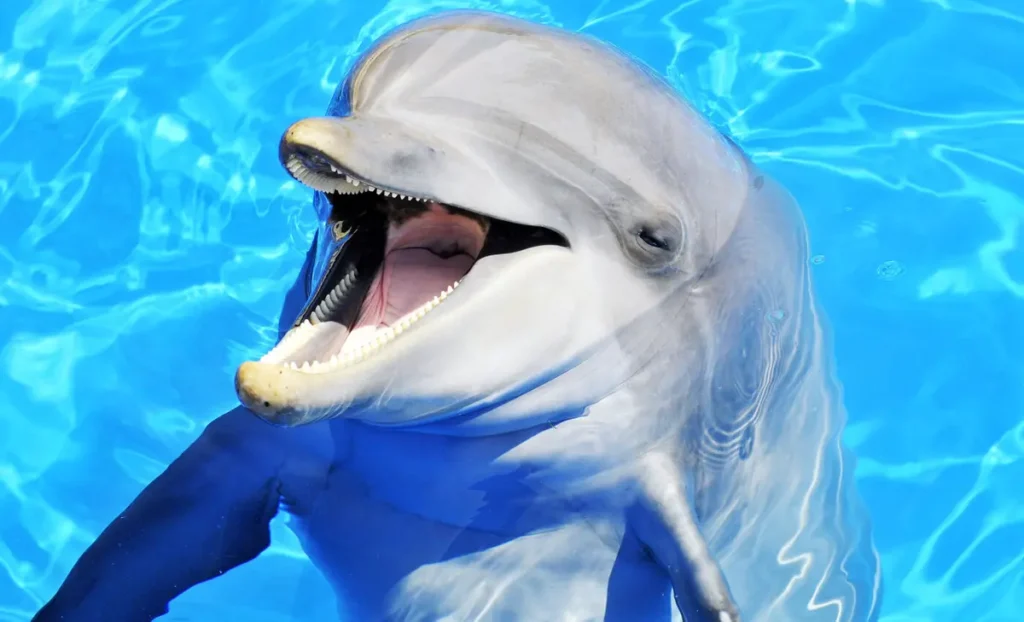Dolphins are one of the most beloved marine animals. They are highly intelligent, social, and playful, which makes them a favorite among nature enthusiasts. Beyond their charming personalities, dolphins possess many unique traits and behaviors that are less commonly known. Here are 10 fascinating facts about dolphins that highlight their remarkable characteristics.
1. Dolphins Use Names to Identify Each Other
Dolphins recognize themselves and others using unique whistles, much like humans use names. These signature whistles help dolphins identify individuals within their pods and maintain group cohesion. Research has shown that dolphins can remember these sounds for decades, even after being separated from their pod.

2. Dolphins Sleep with Half Their Brain Awake
Dolphins are voluntary breathers, which means they need to consciously surface for air. To stay safe while sleeping, dolphins rest one hemisphere of their brain at a time. This allows them to monitor their surroundings and continue breathing while still getting the rest they need.
3. Dolphins Have Exceptional Echolocation Abilities
Dolphins use echolocation to navigate and hunt in the ocean. By emitting sound waves and listening to the echoes that bounce back, dolphins can detect objects, predators, and prey with astonishing precision. This ability is so advanced that they can differentiate between fish species and locate items buried under sand.
4. Dolphins Can Recognize Themselves in Mirrors
Dolphins are among the few species capable of self-recognition, a sign of high intelligence. When exposed to mirrors, dolphins exhibit behaviors such as examining themselves, making them one of the rare non-human animals with this level of self-awareness.
5. Dolphins Form Deep Social Bonds
Dolphins are highly social animals that live in pods, often consisting of family members and friends. They form strong bonds and have been observed showing care for injured pod members. In some cases, they cooperate to hunt or protect their group from threats.
6. Dolphins Communicate Using a Variety of Sounds
Dolphins produce clicks, whistles, and other vocalizations to communicate with each other. These sounds convey different meanings, from signaling danger to expressing emotions. Their communication system is considered one of the most complex in the animal kingdom.
7. Dolphins Help Humans in Need
There are documented cases of dolphins assisting humans in distress. Dolphins have guided lost swimmers back to shore, protected individuals from sharks, and even alerted rescuers to stranded people. This altruistic behavior has earned dolphins a reputation for being guardians of the sea.
8. Dolphins Are Cultural Animals
Certain dolphin pods display unique behaviors and hunting techniques that are passed down through generations. For example, some dolphins use sponges as tools to protect their noses while searching for prey on the seafloor. This transmission of knowledge is considered a form of culture.
9. Dolphins Can Reach Speeds of Over 20 Miles Per Hour
Dolphins are incredible swimmers, capable of reaching speeds up to 25 miles per hour. Their streamlined bodies and powerful tails make them efficient and agile in the water. Spinner dolphins are especially known for their acrobatic jumps and spins.
10. Dolphins Have Complex Brains
The dolphin brain is larger in proportion to its body than most animals, including humans. Their brains have a highly developed neocortex, which is associated with problem-solving, emotions, and social interaction. This neurological complexity explains their intelligence and playful nature.
Conclusion
Dolphins are extraordinary creatures that continue to captivate scientists and the public alike. Their intelligence, social behaviors, and adaptability make them a vital part of marine ecosystems. Learning more about these fascinating animals not only deepens our appreciation for them but also highlights the importance of protecting their habitats. By understanding dolphins better, we can take steps to ensure their survival for generations to come.


